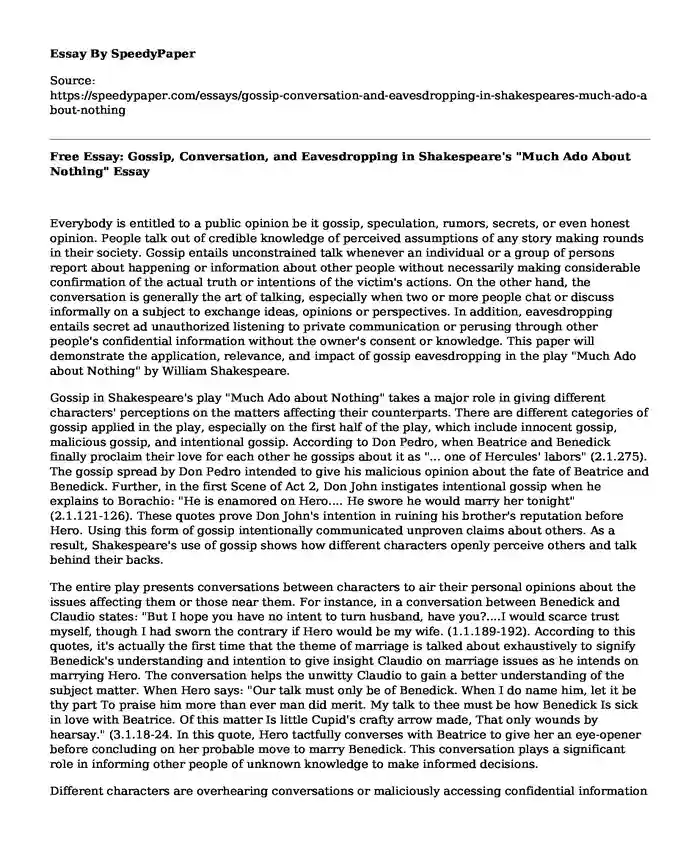
| Type of paper: | Essay |
| Categories: | Shakespeare |
| Pages: | 3 |
| Wordcount: | 819 words |
Everybody is entitled to a public opinion be it gossip, speculation, rumors, secrets, or even honest opinion. People talk out of credible knowledge of perceived assumptions of any story making rounds in their society. Gossip entails unconstrained talk whenever an individual or a group of persons report about happening or information about other people without necessarily making considerable confirmation of the actual truth or intentions of the victim's actions. On the other hand, the conversation is generally the art of talking, especially when two or more people chat or discuss informally on a subject to exchange ideas, opinions or perspectives. In addition, eavesdropping entails secret ad unauthorized listening to private communication or perusing through other people's confidential information without the owner's consent or knowledge. This paper will demonstrate the application, relevance, and impact of gossip eavesdropping in the play "Much Ado about Nothing" by William Shakespeare.
Gossip in Shakespeare's play "Much Ado about Nothing" takes a major role in giving different characters' perceptions on the matters affecting their counterparts. There are different categories of gossip applied in the play, especially on the first half of the play, which include innocent gossip, malicious gossip, and intentional gossip. According to Don Pedro, when Beatrice and Benedick finally proclaim their love for each other he gossips about it as "... one of Hercules' labors" (2.1.275). The gossip spread by Don Pedro intended to give his malicious opinion about the fate of Beatrice and Benedick. Further, in the first Scene of Act 2, Don John instigates intentional gossip when he explains to Borachio: "He is enamored on Hero.... He swore he would marry her tonight" (2.1.121-126). These quotes prove Don John's intention in ruining his brother's reputation before Hero. Using this form of gossip intentionally communicated unproven claims about others. As a result, Shakespeare's use of gossip shows how different characters openly perceive others and talk behind their backs.
The entire play presents conversations between characters to air their personal opinions about the issues affecting them or those near them. For instance, in a conversation between Benedick and Claudio states: "But I hope you have no intent to turn husband, have you?....I would scarce trust myself, though I had sworn the contrary if Hero would be my wife. (1.1.189-192). According to this quotes, it's actually the first time that the theme of marriage is talked about exhaustively to signify Benedick's understanding and intention to give insight Claudio on marriage issues as he intends on marrying Hero. The conversation helps the unwitty Claudio to gain a better understanding of the subject matter. When Hero says: "Our talk must only be of Benedick. When I do name him, let it be thy part To praise him more than ever man did merit. My talk to thee must be how Benedick Is sick in love with Beatrice. Of this matter Is little Cupid's crafty arrow made, That only wounds by hearsay." (3.1.18-24. In this quote, Hero tactfully converses with Beatrice to give her an eye-opener before concluding on her probable move to marry Benedick. This conversation plays a significant role in informing other people of unknown knowledge to make informed decisions.
Different characters are overhearing conversations or maliciously accessing confidential information not meant for their knowledge. For instance, Beatrice talks ill of Benedick: "Why, he is the prince's jester: a very dull fool; only his gift is in devising impossible slanders: none but libertines delight in him; and the commendation is not in his wit, but in his villainy; for he both pleases men and angers them, and then they laugh at him and beat him." (2.1.114-119). According to these quotes, Beatrice did not intend for Benedick to eavesdrop on her private opinion. Consequently, overhearing conversations and lamentation negatively made about his ended up offending Benedick because it was not intended for his ears. In another instance, Benedick laments to himself, "I should think this a gull, but that the; white-bearded fellow speaks it: knavery cannot; sure, hide in such reverence" (2.3.97-99). In this quote, Benedick is skeptical about Don Pedro's mockery. This information is overheard by Beatrice who finally proclaims her love for him. In this note, eavesdropping plays a significant role in placing private information on the unintended recipient thus causing disagreements or incite.
Shakespeare's use of language and communication skills to demonstrate the different forms of information passed between individuals employed gossip, conversations, and eavesdropping. Gossip played a significant role in passing speculations and perceived myths outside the concerned party knowledge, while the use of conversation helps people of a debate about certain enlightening issues in life. Eavesdropping occurred when personal information falls in the unintended ears. The integrative application of the three communication skills enlightens the characters on unsuspecting information previously unknown.
Works cited
Smith, Emma. The Cambridge Introduction to Shakespeare. Cambridge: Cambridge University Press, 2007.
Cox, John F., ed. Shakespeare in Production: Much Ado About Nothing, by William Shakespeare. Cambridge: Cambridge University Press, 1998
Cite this page
Free Essay: Gossip, Conversation, and Eavesdropping in Shakespeare's "Much Ado About Nothing". (2022, May 25). Retrieved from https://speedypaper.net/essays/gossip-conversation-and-eavesdropping-in-shakespeares-much-ado-about-nothing
Request Removal
If you are the original author of this essay and no longer wish to have it published on the SpeedyPaper website, please click below to request its removal:
- Literary Essay Sample: How Pope Uses Animal Imagery in Essay on Man
- Free Essay Sample on Product Design
- Essay Example for Everyone: Decision-Making Models
- Sociological Themes in Sarah Hahn's Grief Map
- Essay Sample on Teaching and NAEYC List of Standard
- Free Paper Sample: Virtual Team Writing Strategies That Reduce Emotional Hijacking
- Essay Sample. Relations Between States in Classical Greece and the Greek Dark Ages
Popular categories




